| Srl | Item |
| 1 |
ID:
127115
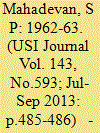

|
|
|
| 2 |
ID:
100041
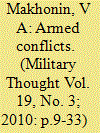

|
|
|
| 3 |
ID:
133977
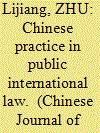

|
|
|
|
|
| Publication |
2014.
|
| Summary/Abstract |
This Survey covers materials reflecting Chinese practice in 2013 relating to: Fundamental Principles of International Law (The Principle of Equality of State Sovereignty; Permanent Sovereignty over Natural Resources; Prohibition of Threat or Use of Force; Peaceful Settlement of International Disputes; Non-intervention in Internal Affairs); Sources of International Law (Identification of Customary International Law; Guide to Practice on Reservations to Treaties; Provisional Application of Treaties); Relationship between International Law and Chinese Law (Act on Administration of Tax Collection Revised; Act on the Prevention and Control of Environmental Pollution by Solid Wastes Revised; Act on Seed Revised; Act on Animal Epidemic Prevention Revised; Act on Trade Mark Revised; Act on Fishery Revised; Act on Marine Environment Protection Revised; Act on Customs Revised); Recognition of New States (Palestine; Kosovo); Jurisdiction and Immunity (Scope and Application of Universal Jurisdiction; Immunity of State Officials from Foreign Criminal Jurisdiction); China's Territorial Integrity (Taiwan; Tibet; China-India Border; Diaoyu Island and its Affiliated Islands; Nansha Islands); Polar Regions (Arctic Council; Antarctic Treaty); International Law of the Sea (Submission to the Commission on the Limits of the Continental Shelf in part of the East China Sea; Commission on the Limits of the Continental Shelf (CLCS); International Seabed Authority (ISA); International Tribunal for the Law of the Sea (ITLOS); Marine Biodiversity beyond Areas of National Jurisdiction; Reorganization of State Ocean Administration); International Air and Space Law (Establishment of Air Defense Identification Zone in East China Sea; Peaceful Use of Outer Space; Transparency and Confidence-Building Measures in Outer Space; International Code of Conduct for Outer Space Activities); International Cyberspace Law (International Code of Conduct for Information Security; Cyber Crime); Aliens (Regulation on Administration of Exit and Entry); International Human Rights Law (Universal Periodic Review; Office of the High Commissioner for Human Rights (OHCHR); International Covenant on Civil and Political Rights (ICCPR); Convention against Torture and Other Cruel Inhuman or Degrading Treatment or Punishment (CAT); Convention on the Rights of the Child (CRC); Human Rights Treaty Bodies and Their Reform; Rights of Indigenous Peoples; Action Plan for Fighting Human Trafficking (2013-2020)); International Humanitarian Law (Protection of Civilians in Armed Conflicts; Protection of Journalists in Armed Conflicts); International Law on Disasters (Protection of Persons in the Event of Disasters); International Law on Arms Control, Disarmament and Non-proliferation (Nuclear Disarmament and Non-Proliferation; Chemical Weapons Convention; Biological Weapons Convention (BWC); Convention on Certain Conventional Weapons (CCW); Amended Protocol II to the CCW; Ottawa Convention; Convention on Cluster Munitions (CCM); Protocol V to the CCW (ERW); Improvised Explosive Devices (IEDs); Lethal Autonomous Robots; Arms Trade Treaty (ATT); Small Arms and Light Weapons; Conference on Disarmament (CD)); International Criminal Law (Crimes against Humanity; International Criminal Court (ICC); ICTY and ICTR; UN Comprehensive Convention against Terrorism; Agreement on the Procedure for Organizing and Conducting Joint Anti-Terrorist Exercises by Member States of the Shanghai Cooperation Organization; Agreement on the Procedure for Organizing and Conducting Joint Anti-Terrorist Operations within Member States of the Shanghai Cooperation Organization; Trafficking in Cultural Property; Ratification of the Treaty on Transfer of the Convicted between the People's Republic of China and the Republic of Kyrgyzstan; International Criminal Judicial Assistance and Police Cooperation); International Environmental Law (Climate Change; Sustainable Development; Protection of Atmosphere; Action Plan on Air Pollutio
|
|
|
|
|
|
|
|
|
|
|
|
|
|
|
|
| 4 |
ID:
053650
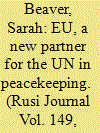

|
|
|
| 5 |
ID:
103029
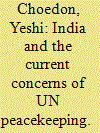

|
|
|
| 6 |
ID:
133940
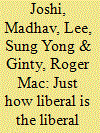

|
|
|
|
|
| Publication |
2014.
|
| Summary/Abstract |
This article assesses the extent to which the liberal peace (the dominant form of internationally supported peacemaking) actually deserves the sobriquet 'liberal peace'. In recent years, an intense debate emerged on this question as critics of the critique of the liberal peace have sought to downplay the dominance of the liberal peace. These debates are interesting but they are mainly based on qualitative analysis supplemented with some case study material, and often rely on assertions rather than evidence. This article seeks to add to this debate with simple aggregate data from the Peace Accords Matrix that is comprehensive and comparative. The article constructs a five-part framework to analyse the liberal elements of peace accords liberalism and then tracks the extent to which the elements of the framework are found in peace accords. Through this examination, it is found that the liberal peace is indeed the dominant form of peace-support intervention, although there are considerable variations in the extent and implementation of the liberalism in peacebuilding.
|
|
|
|
|
|
|
|
|
|
|
|
|
|
|
|
| 7 |
ID:
190541
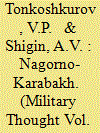

|
|
|
|
|
| Summary/Abstract |
This paper examines the procedure for preparing and conducting the peacekeeping operation in Nagorno-Karabakh by RF Armed Forces units.
|
|
|
|
|
|
|
|
|
|
|
|
|
|
|
|
| 8 |
ID:
052051
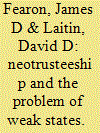

|
|
|
| 9 |
ID:
101723
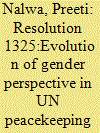

|
|
|
|
|
| Publication |
2011.
|
| Summary/Abstract |
The year 2010 commemorated ten years of the adoption of Resolution 1325 by the UNSC but the commemoration is without celebration. The apparent dissonance between the policy and the practice of the Resolution 1325 renders it inappropriate. This paper reviews the evolution of gender perspective in UN peacekeeping operations and assesses the gains and failures of the Resolution 1325 in gender balancing, recruitment and retention of women in the security sector. This assessment would indicate why the celebration is missing, primarily because through the decade, the progress in gender mainstreaming in the scope and breadth of peacekeeping missions, as reflected by statistical data, has been dismal
|
|
|
|
|
|
|
|
|
|
|
|
|
|
|
|
| 10 |
ID:
076360
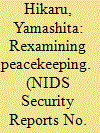

|
|
|
| 11 |
ID:
004851
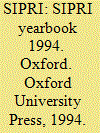

|
|
|
|
|
| Publication |
Oxford, Oxford University Press, 1994.
|
| Description |
xxxiii, 841p.hbk
|
| Series |
SIPRI Yearbook 1994
|
| Standard Number |
0198291825
|
|
|
|
|
|
|
|
|
|
|
|
Copies: C:2/I:0,R:0,Q:0
Circulation
| Accession# | Call# | Current Location | Status | Policy | Location |
| 035856 | 327.17405/SIP 035856 | Main | On Shelf | General | |
| 035883 | 327.17405/SIP 035883 | Main | On Shelf | General | |
|
|
|
|
| 12 |
ID:
078634
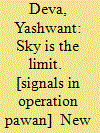

|
|
|
|
|
| Publication |
New Delhi, Yeashwant Deva, 2007.
|
| Description |
xv, 371p.
|
| Standard Number |
8190371908
|
|
|
|
|
|
|
|
|
|
|
|
Copies: C:2/I:0,R:0,Q:0
Circulation
| Accession# | Call# | Current Location | Status | Policy | Location |
| 052566 | 384.043/DEV 052566 | Main | On Shelf | General | |
| 052567 | 384.043/DEV 052567 | Main | On Shelf | General | |
|
|
|
|
| 13 |
ID:
133941
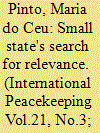

|
|
|
|
|
| Publication |
2014.
|
| Summary/Abstract |
During the cold war period, Portugal was largely absent from participation in United Nations Peacekeeping operations (UNPKO). However, since the end of the cold war, Portugal has reviewed its peacekeeping policy and has made a strong commitment to UN operations. The aim of this article is to determine Portugal's motives for participating in PKO, a costly and hazardous venture, especially for a small country with limited resources. I argue that Portugal's involvement in peacekeeping stems from the belief of policy-makers that such activities promote the country's national interests by enhancing its influence in key international fora such as the UN. However, the article also argues that the concept of national interest is best understood through the lens of constructivism, because constructivist scholarship has largely been interested in how international norms, rules and principles shape and constitute state understandings of practices and order. Peacekeeping has thus been pursued by Portugal as a vehicle for the pursuit of a socially constructed conception of the national interest, rooted in a commitment to particular hegemonic values and conceptions of international peace and security embodied in, and by, organizations such as the UN.
|
|
|
|
|
|
|
|
|
|
|
|
|
|
|
|
| 14 |
ID:
057377
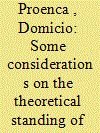

|
|
|
| 15 |
ID:
100025
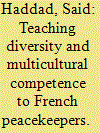

|
|
|
|
|
| Publication |
2010.
|
| Summary/Abstract |
Through the example of the UN Interim Force in Lebanon (UNIFIL), this article examines how intercultural skills are used by the French military in their daily life during a peacekeeping operation. As an essential part of professional military education and a component of military efficiency, cultural awareness is supposed to play a key role in fulfilling peacekeeping missions. The contention here is that there is a gap between the official discourse on cultural awareness and the way that the military experience their daily life and perceive multiculturalism during operations. Cultural diversity does not feature as a trump card, and national boundaries remain strong, in for example the compartmentalization of areas of operation and the restrictive UN and national rules of engagement. These limit the formal and informal contacts between contingents and with the population.
|
|
|
|
|
|
|
|
|
|
|
|
|
|
|
|
| 16 |
ID:
097936
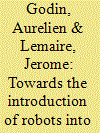

|
|
|
| 17 |
ID:
051823
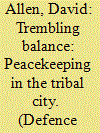

|
|
|
| 18 |
ID:
190533
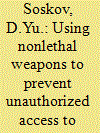

|
|
|
|
|
| Summary/Abstract |
This paper highlights the importance of using nonlethal weapons to curb unauthorized access to guarded territory. It shows the need to use such weapons in everyday activity, during combat, in peacekeeping operations, and when dealing with mass disturbances.
|
|
|
|
|
|
|
|
|
|
|
|
|
|
|
|
| 19 |
ID:
132800
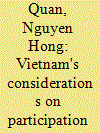

|
|
|
|
|
| Publication |
2014.
|
| Summary/Abstract |
True UN peacekeeping started in 1948 as an important initiative during the period of East-West confrontation. At that time, after the Second World War, none of the two major powers, the United States and the Soviet Union, emerged as absolute dominant. Therefore, the two powers decided to create a "neutral" group called "peacekeepers" under the auspices of the UN. The initiative was accepted by the majority of UN members and was expected to work as a mechanism to prevent and settle conflicts without one of the two big powers taking advantage and/or to prevent war in certain strategic areas.
|
|
|
|
|
|
|
|
|
|
|
|
|
|
|
|